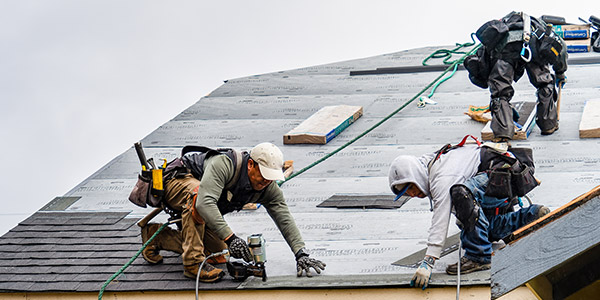Housing News
How to Choose the Right Roofer
September 21, 2018
Ready to stay warm and dry this winter? The best way to protect you and your family from the elements is to have a roof that's in excellent shape. Depending on the materials used, a new roof should last 20 to as long as 50 years. Once done, you should have solid shelter (with no leaks) for several years to come.
If a replacement is imminent though, doing your research can pay off in the end.
Determine the Sticker Price
Though the cost of replacing a roof can vary widely, it's generally based on the same factors: the pitch of your current roof, how high it is off the ground, the materials you choose, the size of the roof, and the job site.
For instance, asphalt shingles are the most affordable roofing material. A basic roof using this material could cost as little as a few thousand dollars for both the installation and the materials. That's far less than remodeling a kitchen. It would also be expected to last roughly 25 years.
Meanwhile, replacing a high tile roof, with multiple peaks – which makes it more perilous for the workmen, especially given the weight of the materials – would cost substantially more. Tile and slate roofs can easily rival the cost of a new luxury car. However, a tile or slate roof has a life expectancy of at least 50 years.
Whether the roof is a "tear-off" also affects the cost. A new layer of shingles can be added to an existing shingle roof unless the layers exceed what is allowed under local ordinances. Tear-off projects involve extra time and labor as well as disposal costs, which is why layering, if you can, is preferred.
Roof Replacement Checklist
To help you prepare for your roof project, here are some of the actions you'll want to consider before hiring a contractor.
1 Get several bids for your job. This helps you understand how each roofing contractor expects to approach your project. However, keep in mind that while cheaper is better for your wallet today, a higher-quality job could cost you less in the long run.
2. Request references and check them. Call previous customers and ask their advice on the best ways to communicate with the roofer. Also, drive by the homes to see the actual work. Look for online reviews to see if there have been any complaints and, if so, how they were handled. You may also want to see if the National Roofing Contractors Association has any information.
3. Ask for proof of insurance. This is different from a reference. It involves calling the roofing company's insurance agency to verify they have workers' compensation coverage in the event there is an accident on your property.
4. Get the scope of work in writing. Before you sign anything, ensure your expectations align with the work promised. The contract should specify the type of underlayment material used, ventilation plans, and even the types of fasteners and flashing to be used. You should also know how your yard and home will be protected during the project. The tear-off process can create a lot of debris. The dirt and old roofing materials can get into everything you have stored in your garage and attic, making cleanup very difficult. Make sure you include who is responsible for acquiring and paying for any permits in the contract.
5. Know what is under warranty. Understand what is under warranty and with whom. Materials are typically the responsibility of the manufacturer, while workmanship should be guaranteed by the roofing company.
6. Choose your roofer. Some companies will send representatives door to door to drum up sales during slow periods. It is best to choose your roofer, rather than select one who has sought you out without interviewing several others you found yourself.
A home is often referred to as "the roof over your head" for a reason. To keep your family safe from the elements, replacing this essential part of your house is worth every bit of your due diligence.




